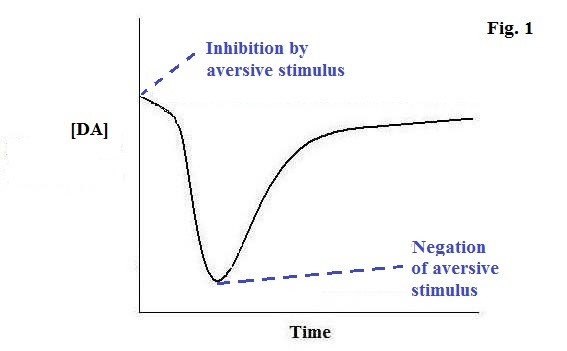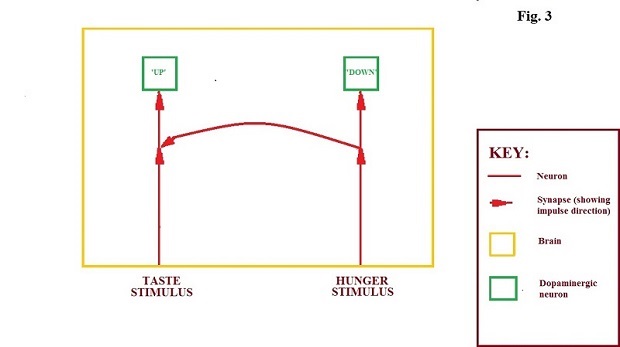The Guess Worker
A letter to Ethan Bromberg-Martin
Overview:
- Ethan Bromberg-Martin is Assistant Professor at the Department of Neuroscience, Colombia University
- In 2010 he published (with co-authors) a review article on dopamine in motivational control
- The article bases its hypotheses on findings that there are at least two types of dopamine neuron
- I wrote to him to challenge his ideas
18th August 2016
Dear Dr. Bromberg-Martin,
I read with interest your 2010 paper "Dopamine in motivational control: rewarding, aversive and alerting". *1 Even though it is clear that DA neurons signal for both rewarding and aversive events, I think you will agree that current hypotheses do not explain how this signalling results in motivation. *2
I believe I have a credible answer. Most research to date has concentrated on the firing of DA neurons but there has been little consideration of the fluctuations of DA in synapses. It has been assumed that specific concentrations of DA cause specific degrees of motivation: a high concentration of DA is thought to give a high level of wanting and a low concentration to give a low level of wanting.
However I would suggest that, instead of fixed concentrations of DA, changes in DA concentrations are important. I propose that falls in DA are interpreted by the brain as being unpleasant and so are motivational, whereas rises in DA are interpreted as being pleasurable and so are rewarding.
It may seem as if this proposition makes sense only for one type of DA neurons – those in the midbrain which are inhibited by aversive events and excited by rewards. *3 However, to understand what is happening in other populations of DA neurons, I believe it is necessary to distinguish between two kinds of rewarding stimuli: those which are intrisincally rewarding, and those that are rewarding because they negate aversive stimuli. (Food comprises both stimuli: food is intrinsically rewarding through taste, but it also negates the stimuli which cause hunger.)
It is likely that the neurons of the midbrain are excited only by stimuli which negate aversive events. These stimuli probably do not cause rises in DA unless DA levels have already been pushed down by aversive stimuli (see fig.1).

In contrast, intrinsically rewarding stimuli probably excite a different type of DA neuron and here do cause rises in DA without DA levels having been pushed down first (see fig.2). (I will call the neurons which respond according to fig.1 down-dopaminergic neurons and the neurons which respond according to fig. 2 up-dopaminergic neurons.)

As we can see in fig. 2, rises in DA after excitation are followed by falls. This means an intrinsically rewarding stimulus first will be felt as being pleasurable, then will be felt as being unpleasant. The two feelings together make up what up to now has been thought of as one feeling - incentive salience. The initial rise in DA makes the stimulus attractive whereas the subsequent fall motivates an animal to search for new stimuli in order to make new synaptic connections.
The fact that some neurons are excited by both rewarding and aversive events is a consequence of connections between up- and down-DA neurons. If we imagine a connection between the neurons for hunger and taste as in fig. 3, we can see that impulses from the hunger neuron will be diverted towards the taste neuron, so exciting the taste neuron. In other words, an averse stimulus has excited the neuron of a rewarding stimulus. (Incidentally fig. 3 also explains why food seems tastier when hungry.)

As for alerting signals - I agree that information is a reward in its own right. All stimuli which we are conscious of, and which are not aversive, are likely to be at least minimally pleasurable. Therefore such stimuli probably excite up-DA neurons. The motivational value of these neurons is enhanced if they form connections with other neurons with greater reward or aversive value.
I realise that these ideas differ from yours, but in any case I hope you find them interesting and would welcome any comments from you about them.
Regards, Philip Ludikar *4
(The notes below were not included in the letter.)
*1. See ScienceDirect
This article draws upon results published in a 2009 paper "Two types of dopamine neuron distinctly convey positive and negative motivational signals" by M.Matsumoto and O.Hikosaka. (See Nature)
*2. DA is an accepted abbreviation for dopamine
*3. When I first read Matsumoto's and Hikosaka's 2009 paper (see *1. above), I thought my ideas must be wrong. Why would down-dopaminergic neurons be inhibited by averse events and excited by rewarding events?
Then I realised: at rest dopaminergic neurons fire tonically, which means they fire at low, steady rate. These neurons are therefore constantly releasing a small amount of dopamine into their synapses. If we suppose that impulses from aversive stimuli block this release, then the concentration of dopamine will fall. Because dopamine is a neurotransmitter, a fall in dopamine will result in a reduced rate of firing. In other words, the neurons become inhibited.
If we suppose that afterwards the aversive stimulus is removed, there will be a sudden release of dopamine. With the sharp increase of dopamine the neurons will start firing again. In other words, they become excited.
The experimental results therefore do seem to support my theoretical model – or at least they don't contradict them. I haven't been proved wrong.
*4. I wrote an identical letter to Okihide Hikosaka, Ethan Bromberg-Martin's co-author. Neither replied. I can only speculate as to why. But it is understandable: time spent corresponding with non-academics is not time spent well. Non-academics aren't knowledgeable and usually have cranky opinions.
But let's imagine that I was their head of department and had the power to force them to consider my ideas. What would they make of them? I guess they would say they are too simplistic. I would retort that the reality is certainly more complex but I'm after broad principles, not details. They would then undoubtedly say that by discovering the details they will edge towards the truth, albeit in small steps. To that I would say the details won't give them the answers by themselves. Without the bigger framework they won't be able to put the smaller pieces of information together.
They would then say: what kind of bigger framework am I talking about?
The one built up by answering the basic questions they forgot to ask, I would tell them. They are investigating motivation but haven't asked themselves what motivation is. They write about signals but don't ask how these signals motivate an animal. They talk about incentive salience but don't ask how salience could give incentives. They study rewarding and aversive stimuli but they don't ask what pain and pleasure do. They test rewarding stimuli but don't ask if there could be more than one kind of rewarding stimulus. They see neurons being excited by both aversive and rewarding stimuli but don't ask if a neural connection could be responsible. They analyse the firing of neurons but don't ask what is happening inside the synapses.
Worst of all, I tell them, they have forgotten to ask why the brain developed the way it did. Without answering that question they will never be able to make sense of the apparently unrelated facts they uncover in their experiments. They have constructed a theory with alerting signals, motivational salience signals and motivational value signals which somehow together are supposed to co-ordinate behaviour. Only they can't explain how. I put it to them straight: they have devised a theory which is loosely knit and full of holes.
Wait a minute, they protest, their work isn't finished! One day, when they have done enough experiments, they'll know all the answers and everything will fall into place. We just need to be patient.
Can I get them to agree with me that my ideas are more coherent than theirs? No, of course not. Would they admit that there's nothing in their results which contradicts my ideas? No, not even that. They have to be right even when they are probably wrong because their careers and their reputations depend on it. So instead of saying something they scowl and sneer and slink silently out of the room.
They couldn't answer me, I think jubilantly! I tell myself I've won the argument - if not in real life, at least in this post.

Comments powered by CComment